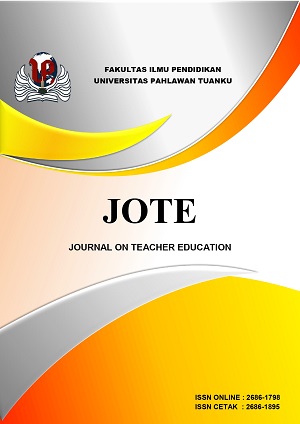Pelatihan Teknis “Prompt Engineering” dalam Pemanfaatan AI Chat GPT untuk Meningkatkan Kemampuan Menulis Artikel Ilmiah Mahasiswa Baru
Abstract
Keywords
Full Text:
PDFReferences
Annas, A.N. et al. (2024) ‘Pelatihan Teknis Penggunaan Aplikasi Artificial Intelligences (AI) Chat Gpt Dan Bard AI Sebagai Alat Bantu Bagi Mahasiswa Dalam Mengerjakan Tugas Perkuliahan’, Journal Of Human And Education (JAHE), 4(1), pp. 332–340.
Dermawan, R.D. and Herdianto, H. (2024) ‘Meningkatkan Kinerja Output ChatGPT Melalui Teknik Prompt Engineering Yang Dapat Dikustomisasi’, Innovative: Journal Of Social Science Research, 4(1), pp. 10646–10664.
Firmansyah, W. et al. (2024) ‘Analisis peluang dan tantangan pemanfaatan metaverse sebagai pemasaran digital’, Jurnal Penelitian Sistem Informasi (JPSI), 2(1), pp. 1–11.
Hodijah, C., Yani, N.W.M.N. and Mohamad Sajili, S.E. (2025) Komunikasi Bisnis dalam Era Artificial Intelligence. Takaza Innovatix Labs.
Kalesaran, F., Kutu’Kampilong, J. and Sanggelorang, E.P. (2025) Psikologi Perubahan: Sinergi Pelatihan dan Budaya Lokal untuk Peningkatan Kapasitas Aparatur Desa. PT. Star Digital Publishing, Yogyakarta-Indonesia.
Lestari, D.P. (2023) ‘Konsep Diri dalam Perencanan Karir Santri Pondok Pesantren Putri Alkhairaat Pusat Palu’, Guru Tua: Jurnal Pendidikan dan Pembelajaran, 6(1), pp. 44–50.
Mahendra, G.S. et al. (2024) Tren Teknologi AI: Pengantar, Teori, dan Contoh Penerapan Artificial Intelligence di Berbagai Bidang. PT. Sonpedia Publishing Indonesia.
RR Ella Evrita H SE, M.M. (2025) Digital Darwinism: Hukum, Kreativitas, dan Evolusi Media di Era AI. PT Indonesia Delapan Kreasi Nusa.
Yessy Asri, S.T. et al. (2025) A Large Language Model (LLM) Penerapan Large Language Model (LLM) dalam Chatbot. Uwais Inspirasi Indonesia.
DOI: https://doi.org/10.31004/abdira.v5i3.752
Refbacks
- There are currently no refbacks.
Copyright (c) 2025 Annisa Nuraisyah Annas, Dwi Pratiwi Lestari, Rini Lestari, Siti Aisyah Hanim, Irvan Malay

This work is licensed under a Creative Commons Attribution-ShareAlike 4.0 International License.





1.png)
